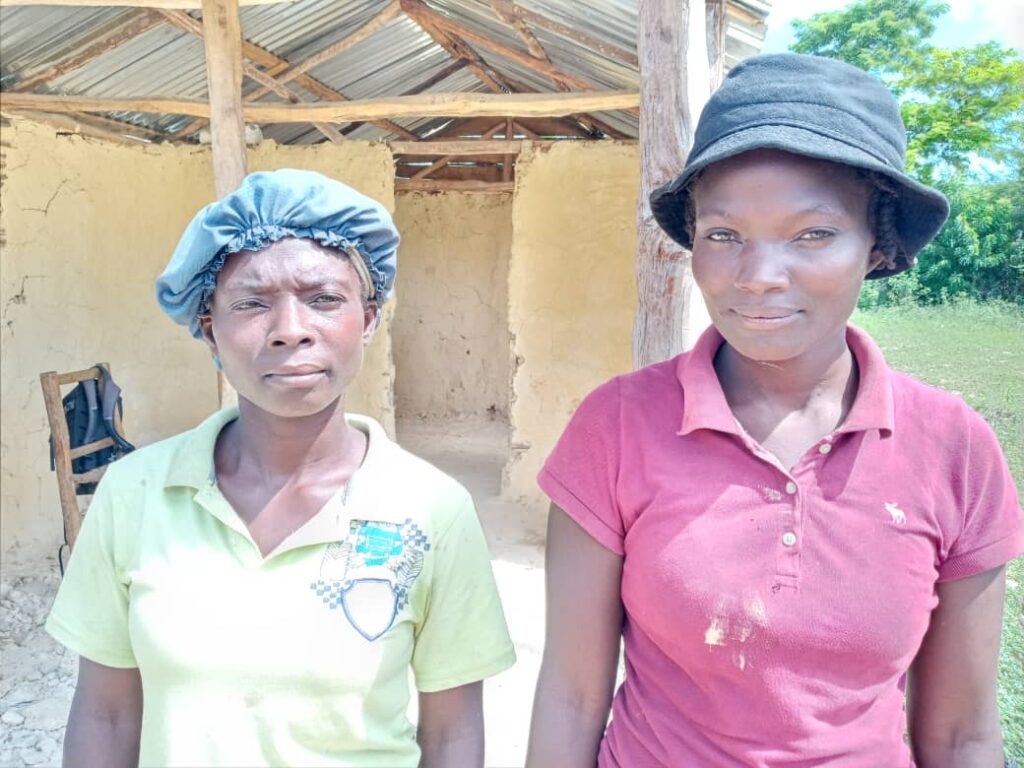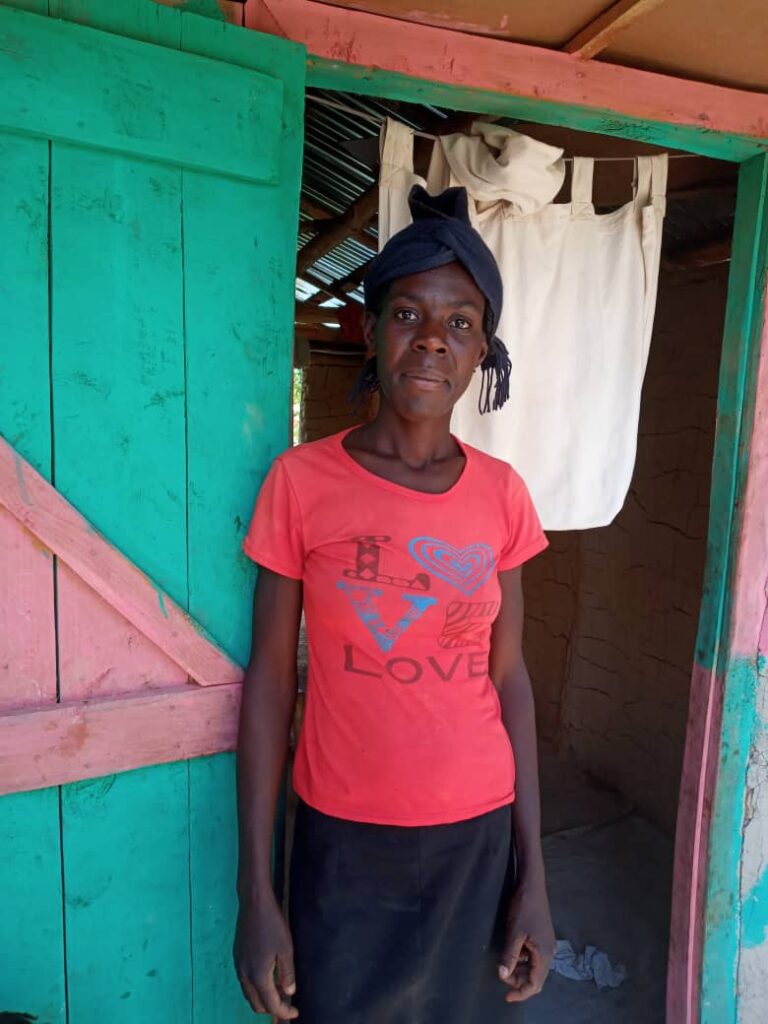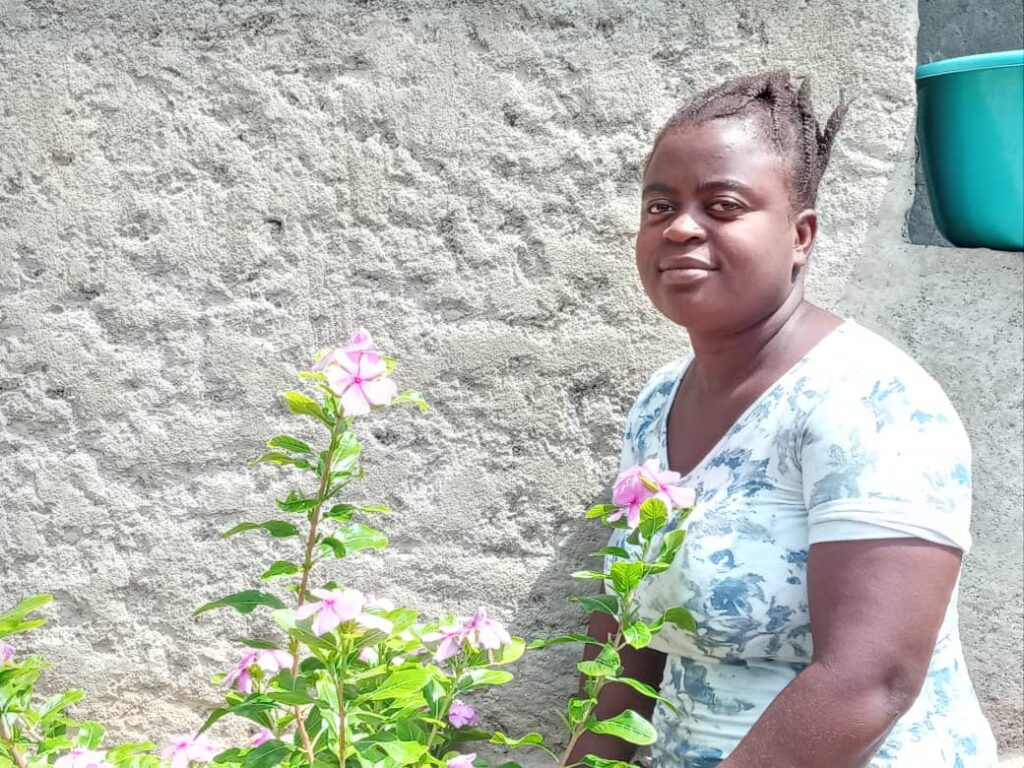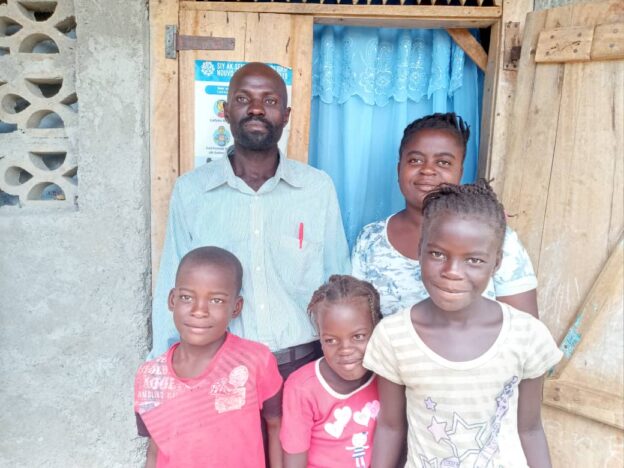The small CLM experience in San Rafayèl has been going on for 13 months. The women we work with there were recently evaluated against the same criteria that will be used to determine whether they will graduate, and more that half of them are ready to graduate already. All have been able to build up the required modicum of wealth. Those who are not yet ready are the ones who haven’t yet completed work on their houses.

Chsitianie and Natacha are sisters. They and their five children have been sharing a home that belongs to the family in Kajouwon, a neighborhood along the road that runs from Pòtoprens, Mibalè, and Ench to San Rafayèl and Okap. When they joined the program, both were already “machann pèpè,” buying and selling secondhand clothes. Christianie sold footwear, and Natacha outerwear.
They would buy the small lots that their limited capital would allow in San Rafayèl, just to the north and take them for sale to Piyon, just to the south. Clothing merchants would come from Ench and the other towns farther south and often buy their whole lot in a single purchase.
But without savings and without partners to contribute to their households and without enough capital to make their businesses grow, they struggled just to feed the kids and send them to school. Natacha had been having an especially rough time. Her two children had been sick, and medical costs were eating away at what she had. They have access to farmland that belongs to their family, but didn’t have the money to plant it.
Natacha was surprised when she was invited to join CLM. “I didn’t really believe it. People had come before with different programs. It wasn’t until the first training that I thought it was real.”
When it came time to choose their enterprises, they made different choices. Christianie asked for a pig and small commerce, and Natacha chose goats and pigs. Small commerce was important to both of them, but Natacha was focused on taking care of her sick baby. “I couldn’t leave her.” Christianie explained that her business is important because it can keep her children fed and allow her to pay into a sòl, or savings club. A hog, on the other hand, will grow in worth until she can sell it to buy a cow. Natacha says that she chose goats because they provide young that can help you pay for school.
Natacha’s goats, however, have made only slow progress. One had two kids, but both died. The other than had one, so she has three goats now. Both her adult nanny-goats are now pregnant. Her hog is growing, but she isn’t yet sure when she’ll sell it. When her child started to get better, she returned to her business using savings from her weekly stipend as her initial investment. Christianie used the capital the CLM program gave her to add to her business, and soon she was buying with 5000 gourds at a time.
She hasn’t chosen to grow her business larger than that yet, however. And it’s not as though she couldn’t. She uses her excess profits in other ways instead. She’s been buying more livestock and making regular deposits into a savings account. Savings are important to her. “You can use the money to send children to school.” She now has eight goats and over 7000 gourds in her savings account.
They are each building a new house, but the houses sit on neighboring plots of land. They have been living and struggling together for a long time, and don’t want to be separated.

Adeline and her partner Esaie live with five small children. She already had four kids when she got together with Esaie, but now they have one together. She was born close to where they now live, but it isn’t where she grew up. Her mother died when she was young, and she was sent to Okap to live with her father’s godmother. Her other siblings were scattered among members of her father’s family.
Before Adeline joined CLM, the couple supported the household through farming. Not their own land, but their neighbors’. Adeline worked and still works as a day-laborer. During harvest, she would make extra money by carrying sacks of produce out to the street so that they could be transported for sale. Carrying sacks is usually men’s work, but Adeline doesn’t care. “I believe in my strength, and it means more money.” Her small, steady income meant that Esaie could take larger, more lucrative jobs. Weeding or tilling an entire field could bring in a lump of cash, but only if the family already had the income they’d need to eat every day.
She chose goats and a pig, but the goats made no progress. She received two, and each miscarried its first litter. At one of the three-day refresher trainings that the program organizes every three months, she felt embarrassed when she had to say, in front of all the other women, that she hadn’t yet been able to increase her goats.
So she made a plan. The father of two of her children had just sent money to pay for their school, and she borrowed that money to buy a goat. She then talked the school’s principal into letting her owe the money. “The kids have to go to school,” she explained. She has since purchased a fourth goat.
She’s had better luck with her pig. She chose a sow, and all five of its litter of piglets have survived. She’s letting them nurse for now, but she wants to sell them at four months and use the money to buy a cow. “I’m not going to keep them longer than that.”
She also now has a small business. She started it with savings from her weekly stipend. Every two weeks, she buys five gallons of cooking oil. She sells it to her neighbors on credit, and they know that when she’s ready to buy another jug-full, they have to pay. So far, they are paying well, and the business is working. She’d like to make it larger, but she feels she can’t until her new home is secured. “As long as your home isn’t in good order, you can’t make your business larger.”
The home is otherwise complete, but it still lacks doors. She plans to add a wider variety of groceries starting in December but then really investing in April. She hopes to make enough money to be able to give up day labor.”I’d like to stop working in other people’s fields.”

Fonise Joseph lives with her partner Thermidor and their three children. When they joined the program, Thermidor was working as a day-laborer. Fonise had a small business selling groceries. She’d buy for about 1000-1,500 gourds at a time. But the commerce would collapse now and again. It never earned enough to cover their expenses consistently, and folks would buy on credit and then be unable to pay.
She chose goats and a pig, and both activities have really taken off. The two goats that the program gave her have had three kids so far, and she has purchased two as well — one out of savings from her weekly stipend and one out of earnings from her business. Her pig had seven piglets, and she sold six to buy a cow. She’s keeping two pigs now.
She also invested in a new business selling used clothing. She buys a small pile from wholesalers in San Rafayèl — just like Natacha — and sells her pile in Piyon. But Fonise has learned an additional trick that maximizes her earnings. Before she takes the pile to Piyon, she picks out individual pieces that she thinks will sell well, and she sells them retail herself. The family lives right next to the local soccer field, and she added a small additional business that takes advantage of that fact. She sells little snacks — crackers, cookies, and the like — to kids who come to play.
The two businesses together are really pushing her forward. They’ve allowed her to make additional investment in livestock, and they enable her to save. She has a savings account and she deposits 500 gourds per month. She also keeps a bwat sekrè, or “secret box,” in her home. That’s a wooden box with a slit in the top that allows someone to insert coins or bills. Like a piggybank.
Thermidor cannot hide his excitement about being a part of CLM. “We imagine what we would have had to go through to have a goat, and we never even thought of owning a cow.”
And Fonise is clear about what is making the program work for her. “The training is important. We are learning to manage what we have. In the past, everything we earned passed right through our hands.”

Thanks for sharing these impressive life stories, Steven. It makes me proud to be a part of your precious work. Tom